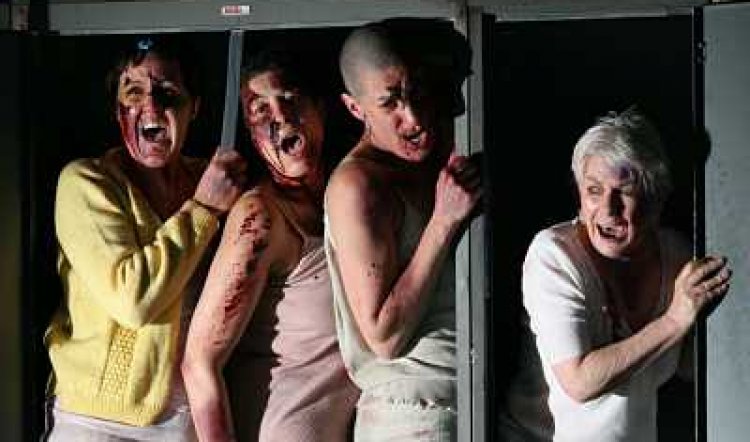
The Women of Troy
The Women of Troy, by Euripides, adapted by Barrie Kosky and Tom Wright; Sydney Theatre Company, Wharf 1, September 22-October 26, 2008; phone (02) 9250 1777 or www.sydneytheatre.com.au
WAR is terrible. We know that only too well from any number of plays, movies and books; which is not to say it’s a message that doesn’t bear repeating. Often. What is not repeated often, if at all however, and certainly not in sensitive society, is the lesson of Hecuba’s fate as what is left of her life plays out before us in The Women of Troy.
What becomes horribly apparent as Hecuba’s life and nightmares return to haunt her, is that the worst thing about war may actually be to survive it. In this case Hecuba, Queen of Troy, is uniquely positioned to experience the very worst of the aftermath of the war between the Trojans and Athenians. She has seen her husband killed, her city laid waste, her daughters raped, mutilated and murdered and eventually, her young grandson hurled to his death because he is the son of a hero and therefore bound to be a future threat. What can be worse than all this than to be alive with the memories and mental images?
In the opening minutes of this sparse yet rich adaptation, all of these things become agonisingly clear through the performance of Robyn Nevin as the ageing queen Hecuba. Her helpless fury, bewilderment and despair are made manifest in her twisted and rigid hands and a voice that rises from her depths like some volcanic eruption of hatred and desolation. It is a monumental performance which seems to have been dragged from her inner being and is made even more powerful through its nuances and subtleties. If Nevin has done anything better it’s hard to recollect: for an hour and twenty minutes she is the icy-fiery eye of a storm which is women’s experience of war over the millennia.
Playing beside her in a trio of roles/archetypes is Melita Jurisic as Hecuba’s blind, crazy daughter Cassandra; her daughter-in-law Andromache, grieving and heavily pregnant; and finally, as the catalyst of the historic disaster, Helen, the fatal femme beloved of Paris – Hecuba’s beloved son. Jurisic is terrific in these diverse portrayals and grabs each by its throat for all its worth. In Hollywood terms, this is the kind of performance the Oscar voters love and give the big tick to – showy, dramatic, crowd-pleasing and irresistible. For my money, however, the play belongs to Robyn Nevin who towers diminutively above the pack of splendid women that surrounds her.
The pack is, of course, a chorus – in this case a trio – of hapless observer-commentators in Natalie Gamsu, Jenny Vuletic and Queenie van de Zandt. In a set-up that has been likened to the images now so familiar from the abuse circus of Abu Ghraib, they are stripped to their vulnerable underwear, their bruises and bloody injuries adding to that humiliated vulnerability. Each spends most of the time cowering perilously on an upturned box, power cables trailing from ankles, a black hood pulled roughly over the head. (Then photographed on mobile phones by the guards in a further well-known image from recent conflicts.)
The setting (Alice Babidge) for this archetypal horror is a stark, brightly lit (Damien Cooper) open space backed by a wall of stacked metal filing cabinets and shelves that suggest the least comfortable of barracks or prison or Soviet era clerical establishment. The audience sits on white draped seats that lends a look that might be a hospital ward or a place of abandonment; whatever takes your fancy is really the point because it’s all a dream or a nightmare.

At the same time there is an unusual level of restraint for a Kosky work. A rape is suggested rather than seen, beatings and other atrocities are, for the most part, not enacted but merely obvious by the injuries and bruises sported by each of the women. These aides imaginaire are, unsurprisingly, more effective than more obvious graphic depictions and are the work of Lauren Aproietti, credited in the program as “hair wig and make up supervisor” but who deserves her own curtain call for such excruciatingly realistic yet somehow low-key work. It’s one of the many effective things about The Women of Troy – the relative moderation shown in the depiction of these historic horrors means imagination and memory can go into overdrive. Which is where the contemporary analogies arise.
Contemporary and archaic also describes the juxtaposition and interweaving of songs and music into the narrative. Again, the effect is to heighten the action on stage and the invariable contradictions make for almost unbearable drama (where, in truth, there is little actually going on). So, when the battered, terrified women cower in the unhappy shelter of some filing cabinets and begin harmonising “When you’re smiling, when you’re smiling, the whole world smiles with you,” it evokes Vera Lynn, death camps, Playing For Time and other heavenly choirs of the condemned. The last days of Troy could not have been less grim or magnificent.
The Women of Troy constitutes great work by all concerned and it's a strange, inspiring, jaw- and heart-numbing experience that I wouldn’t have missed for the world.
Some may know that Sydney Theatre Company has entered into a sort of exchange partnership with Trafalgar Studios, a theatre in London. The idea is that productions from each should be seen in the other’s theatre. The first show to be presented under this exchange banner is Riflemind, Andrew Upton’s play about a bored and boring old rock band. It seems London’s critics were as underwhelmed or mixed in their opinions of it as those in Sydney, which seems generous. What a pity that the flag-bearing show to go to London could not have been The Women of Troy – new, old, original, brilliant, stirring, terrible and featuring the performance of the year: Robyn Nevin’s Hecuba. War’s a bitch.



